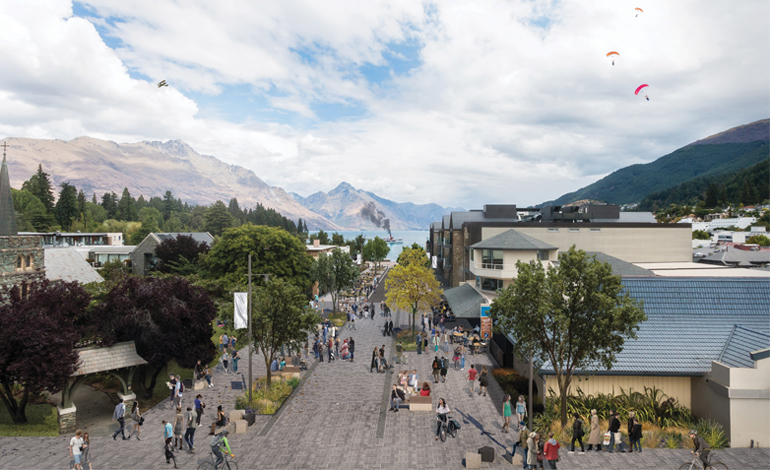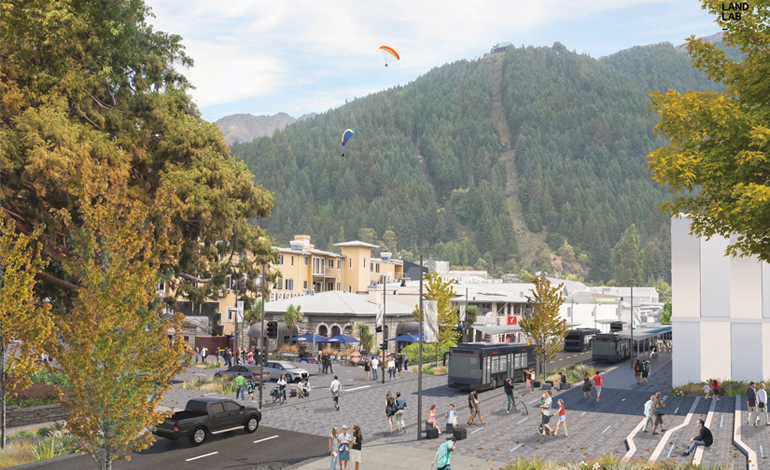Setting the direction for a district – Planning multiple integrated projects in a fast-growing area is never going to be easy. Here’s Queenstown’s answer to a knotty set of problems.
In 2017, the Queenstown Lakes District Council (QLDC), assisted by Rationale, led a multi-disciplinary team to identify and address a number of growth-related challenges arising in the Queenstown Town Centre. The team developed a Masterplan that, for the first time, considered a complex set of projects in an integrated way. This way of working has had a positive influence on the way QLDC approaches its work to plan for future growth.
It’s no secret that Queenstown is under enormous pressure. On a normal day, the Wakatipu Ward has a population of just over 27,000 people. However, during a peak day in high season, Queenstown becomes the eighth largest centre in the country. Looking ahead to 2050, it could be the size Tauranga is today.
Queenstown Lakes is New Zealand’s fastest growing district, with a 5.7 percent rise in population over the past year alone, with visitor numbers expected to continue to increase by 10 percent per annum over the next decade.
The Queenstown Masterplan came about when a long period of under-investment in the town’s infrastructure inevitably collided with an ongoing period of unprecedented and sustained population growth. This, combined with exponential growth in the tourism industry, saw Queenstown reach a point where its network performance and customer experience were beginning to fall short of expectations.
This resulted in consistent problems around congestion, access, liveability, loss of heritage and culture and reduced quality of experience in the Town Centre.
QLDC general manager property & infrastructure, Peter Hansby says it became quite clear that an innovative approach was required to bring a complex range of projects together under the same umbrella.
“We had a lot going on in the town centre and a history of carrying out siloed studies that didn’t result in any great progress. We hadn’t been joining up the dots as well as we could have.
“The approach we took with the masterplan was to look at the Town Centre as a whole and try to understand how a range of issues and projects could be integrated and addressed. This is how we landed on the concept of the Queenstown Town Centre Masterplan.”
QLDC led the project while Rationale directed the process and navigated the team through the Better Business Case (BBC) development. The use of the Treasury-approved BBC approach was crucial in that it provided a recognised investment framework and allowed the team to ensure the project was evidence driven.
This was an innovative approach for QLDC, resulting in a step change in how large, complex projects of this nature are approached.
Rationale MD Edward Guy believes the investment made up front by QLDC to establish the project was critical to ensuring it stayed on course.
“Developing a Masterplan Establishment Report before the project itself began really set a clear direction from the very start. We were able to ensure everyone could see where we were heading, how we were going to do it, what the key elements were and how we were going to tell the story.
“Another key aspect was the use of a team of specialists. There were certainly some differing opinions at times but it meant we had diversity around the table. This way of working ensured the project team didn’t operate in an echo chamber and were able to challenge assumptions and ideas.”
At the same time, the Masterplan team took the innovative step of pulling together an advisory group of community representatives, governance and technical experts. The project team would present to the advisory group at pre-defined programme gateways and the group would challenge the team and provide a report afterwards.
This provided an extra level of assurance to elected members that as the project progressed, it was being interrogated and sense-checked.
This has set the scene for us to build on our community engagement approach on a number of other projects.
Urban Design experts LandLAB worked within the project team to develop a spatial framework that sat alongside the Masterplan. This spatial thinking provided a new way of understanding a complex range of infrastructural requirements for Queenstown and allowed the project team to easily communicate what the Masterplan was trying to achieve to a wide audience.
Community and stakeholder engagement were integral to the success of the Masterplan. With such a complex and integrated project, it became very clear in the early stages that a simple, effective and innovative communications approach was going to make or break the project.
A key to this approach was ensuring that the community had a range of different ways to engage with the project and get updates about the direction in which the Masterplan was heading. At the same time, the project team used community feedback as a key piece of evidence to guide the business case development.
QLDC senior communications advisor Rebecca Pitts led the engagement side of the Masterplan. “Ensuring we could bring the community along for the ride was crucial to the success of the project,” she says.
“I think the community appreciated the transparent and inclusive way we communicated about the Masterplan. We wanted to ensure everyone had a chance to have a say and used a range of channels to reach out further into the community than we had in the past.
“This has set the scene for us to build on our community engagement approach on a number of other projects.”
Importantly, the community has not only been brought along for the ride, but their input has been incorporated into the journey and shaped the process from start to finish.
Where are we now?
The Masterplan was unanimously endorsed by council in June 2018, as part of QLDC’s 2018-28 Ten Year Plan, initiating a $327 million investment programme over 35 years. The approval, buoyed by widespread community support, speaks volumes to the approach taken by the team.
The level of continued investment in projects identified in the Masterplan, and wider infrastructural planning in the district, continues to demonstrate the value of the process.
The Masterplan has offered a greater degree of confidence to investors, both in the public and private sectors. By offering up a clear 30-year vision for Queenstown’s Town Centre and wider district, QLDC has seen a range of partnerships form and projects gain momentum in the past 12 months.
QLDC, the Otago Regional Council and New Zealand Transport Agency have formalised their collaborative working relationship in Queenstown with the formation of the ‘Way to Go’ partnership. This group recognises that all three agencies have important roles to play in driving change and improvements to the district’s transport network.
Following on from the Queenstown Town Centre Masterplan, QLDC and its partners are undertaking a range of significant infrastructure-focused business cases and investigations, including two further masterplans in Frankton and Wanaka.
All the work continues to have an emphasis on transparency and data-driven evidence that allows for all parties to contribute to and understand the progression of the Masterplan.
The follow-on projects include:
• Frankton to Queenstown (Queenstown Town Centre Detailed Business Case and Frankton to Queenstown Single Stage Business Case);
• Wakatipu Active Travel Network Single Stage Business Case;
• Grant Road to Kawarau Falls Bridge Single Stage Business Case;
• Frankton Masterplan and Integrated Transport Programme Business Case;
• Lake Wakatipu Public Water Ferry Service (detailed business case); and
• Wanaka Town Centre Masterplan and Integrated Programme Business Case.
In June this year, QLDC agreed to enter into a Partnership Agreement with Ngai Tahu Property to develop a community precinct in central Queenstown. This could include a civic administration building, public spaces, a performing and visual arts centre and library on the strategic Stanley Street site identified in the Queenstown Town Centre Masterplan.
At the same time, QLDC has recently appointed a preferred bidder as it reaches the next milestone in developing the under-utilised Lakeview site overlooking the town centre.
A consortium, led by Melbourne-based developer Ninety-Four Feet and including Auckland-based investment company Augusta Capital and the Britomart Hospitality Group, brings a talented mix of Kiwi investment and Australian development that will enhance the quality of this key Queenstown site.
QLDC’s Peter Hansby says a range of other initiatives and interventions that stem directly from the work carried out as part of the Queenstown Town Centre Masterplan are also currently being worked through.
“We’re starting to build momentum and making real improvements to our town centre. We have strong confidence in our Masterplan process which has set a clear direction for where we are heading.
“This is a really exciting time to be living in Queenstown and I’m confident the work we’ve put in will have a lasting and positive influence on Queenstown’s future.”
This article was first published in the August 2019 issue of NZ Local Government Magazine.




